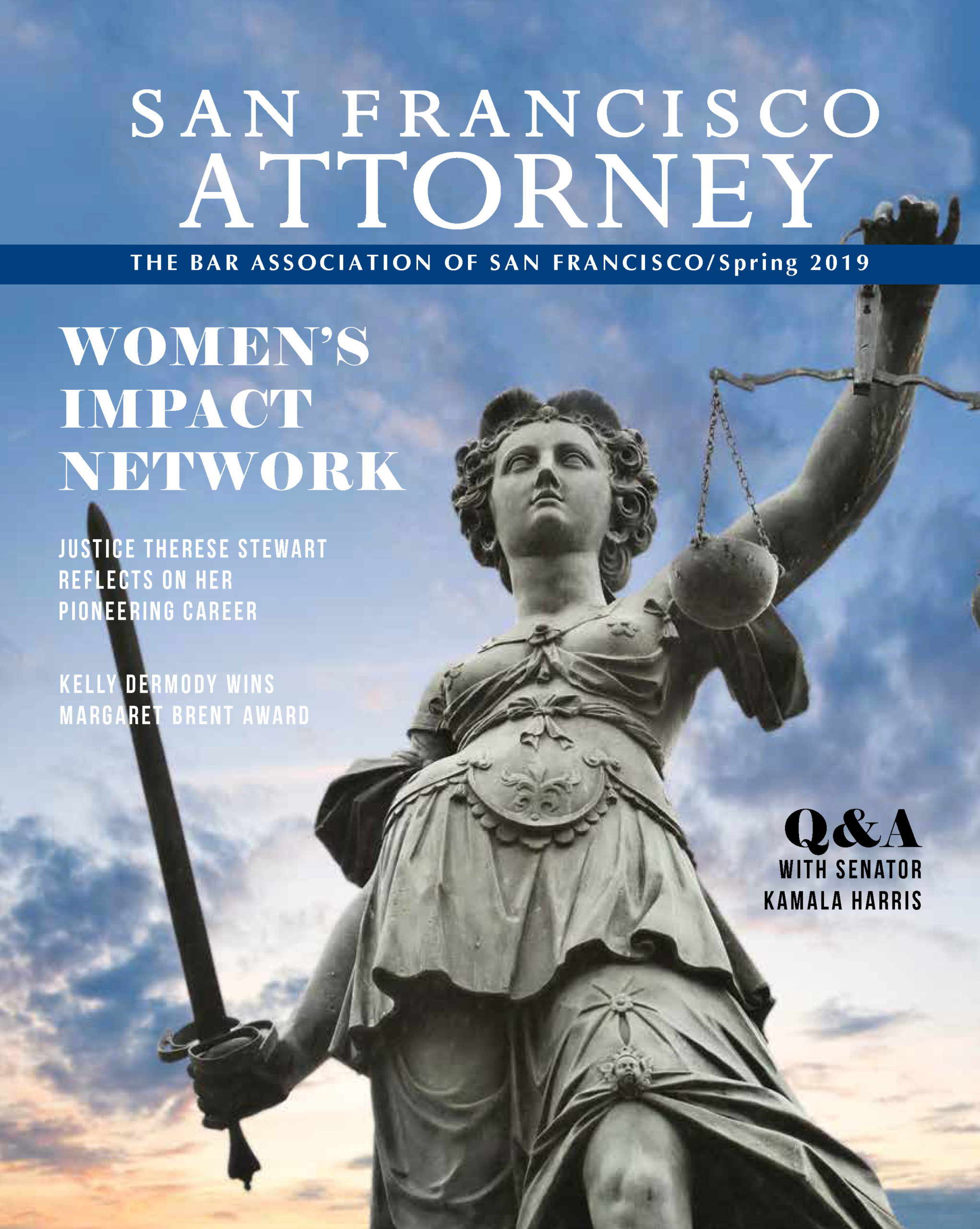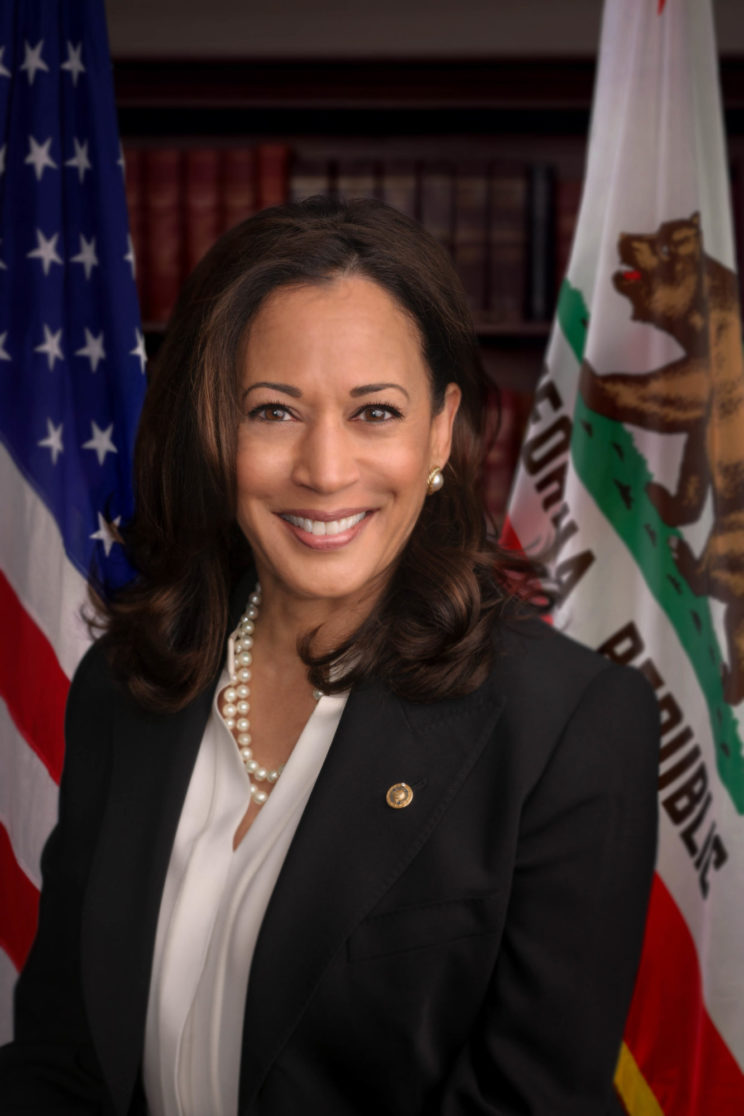

California Senator Kamala Harris is a trailblazer among women attorneys. Before she began her service in the U.S. Senate in 2017, Harris served as the first female District Attorney of the City and County of San Francisco and the first female Attorney General of California.
In 2002-2003, Harris served on the board of directors of the Bar Association of San Francisco and became involved in the No Glass Ceiling Initiative, aimed at increasing the representation of female attorneys and partners in Bay Area law firms.
With a renewed focus on the initiative underway (see cover story on page 22), we checked in with Senator Harris, to get her perspective on women in leadership positions today and what remains to be done on the path to equality and inclusion.
When you served on the Bar Association of San Francisco (BASF) Board of Directors in 2002-2003, you were active in the association’s No Glass Ceiling initiative—aimed at increasing the representation of female attorneys and partners in Bay Area law firms. What prompted you to get involved?
Senator Harris: Bringing more women into roles of leadership is not just the right thing to do, it’s the smart thing to do. It yields better policy and stronger organizations. That’s why I’m so committed to empowering women and making sure they have a seat at the table—whether it’s in a courtroom or a board room or a Senate hearing room.
What are you most proud of in terms of your role in making the No Glass Ceiling Initiative a success?
Senator Harris: I am so proud to see that the ABA Commission and the San Francisco No Glass Ceiling Initiative have been able to bring together the legal community around issues of representation. And the initiative has made it clear that law firms that talk the talk have to also walk the walk on issues of diversity.
What remains to be done on the path to equality and inclusion?
Senator Harris: My mother used to tell me, “Kamala you may be the first to do many things, but make sure you are not the last.”
There are still all kinds of structural barriers to equality. But a big piece of what we need is to create that path for those who will come after us. We need to lift up others as we have been lifted ourselves.
That’s why I always tell young women that you may find yourself in rooms where you’ll be the only one who looks like you. But you should always remember that all of us are in that room with you, supporting you and cheering you on.
What are the biggest challenges faced by women seeking to advance in the legal profession or otherwise?
Senator Harris: There’s no question women in the legal profession and elsewhere continue to face challenges—around balancing work and family, around pay equity, around making workplaces safe from harassment and discrimination.
I also think it’s important that we see people in all their dimensions and all their complexity—be that in the legal community or in everyday life.
That’s why when I get asked about “women’s issues” around the Senate, I say “I’m so glad you want to talk about the economy.” Because the economy is a women’s issue. National security is a women’s issue.
So we can work to support women advancing in the world and in the workplace even as we acknowledge that women cannot be relegated to simply being thought of as a particular constituency or demographic.
As a United States Senator, you have a front-row seat as a record number of women begin their terms in Congress following the “pink wave” election. What kind of impact do you expect these newcomers to have on the institution and/or the national political climate?
Senator Harris: Our future is bright because of the record number of women sworn into the 116th Congress.
From seeking to reduce income inequality to the Green New Deal, these new members are bold and they are challenging the status quo.
And we should celebrate this sisterhood of leaders who are unburdened by what has been and know what can be.
Are there any lessons from this “pink wave” that the legal profession can use to shore up the ranks of women in leadership positions at law firms?
Senator Harris: You’ve got to identify your position of power in a dynamic and not let things just happen to you.
Women are not and should not be relegated to being a stereotype or a trope. We have to tell the stories of all that women are and all of our beautiful diversity.
Because women in power bring a different perspective. An essential perspective. And it’s a perspective I hope to see represented more and more at every level of society.
The more things change, the more they stay the same. BASF is now embarking on Women’s Impact Network: No Glass Ceiling 2.0. What advice do you have for BASF leaders to make the initiative a success?
Senator Harris: When you believe in something—if it’s worth fighting for, it’s a fight worth having.
You will have a lot of those moments where you believe in yourself and hopefully you will surround yourself with people who believe in you. But many others may not. Many others may try to discourage you. But you can’t back down. Remain undaunted in those fights.
About the author:
Laura Ernde is a San Francisco-based communications consultant. She has covered legal affairs for more than a decade, as a journalist and former editor of the California Bar Journal.



